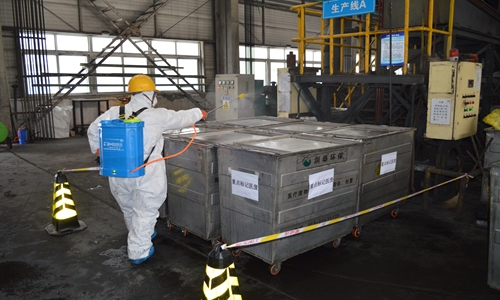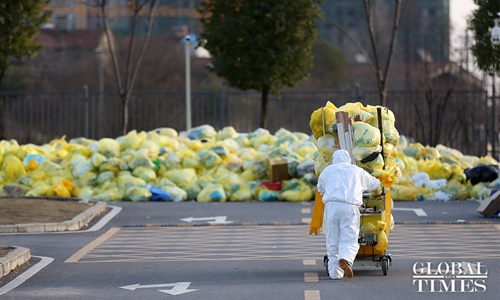
Covid-19 related waste to be treated is stored in sealed containers photo:courtesy of Beijing Ruentex Environment Technology Corporation
Chinese waste treatment companies have slammed a South China Morning Post article which claimed China lacks facilities to treat tons of discarded face masks piling up around the country during the novel coronavirus COVID-19 epidemic.
In the article, the South China Morning Post claimed the country's inadequate medical waste treatment capabilities have been put under a spotlight, citing environmental experts but contrary to the facts several waste treatment companies provided to the Global Times.
The majority of medical waste is being properly dealt with in major cities.
The Beijing Ruentex Environment Technology Corporation, which treats all COVID-19-related clinical and standard waste, told the Global Times on Thursday that their capacity surpasses the amount of waste.
By Wednesday it had disposed of 230 tons of COVID-19 clinical waste from all designated hospitals in Beijing and 110 tons of COVID-19 waste from two airports, four major train stations, and isolation points for close contacts of infected patients.
"Our current processing capacity is 140 tons per day, far beyond the daily amount of medical waste in Beijing which stands at 80 tons a day," Chen Fangyuan, a manager at the company, told the Global Times. He said that overall, medical waste has declined from the 120-130 tons per day before the outbreak as people pay fewer visits to hospitals to avoid the possibility of infection.
All COVID-19 waste is transported and disposed of at dedicated incineration facilities within 48 hours, and follows stricter guidelines than those for other medical waste, Chen said.
"All coronavirus waste must be packed into a double-layer medical waste bag, disinfected, sealed and put into a pressure-resistant cardboard box before being transported to the incineration facilities," he said.
Employees are also required to wear protective googles, an extra layer of gloves, shoe covers and protective clothing as additional precautionary measures when dealing with coronavirus waste, he added.

A worker pushes a trolley full of infectious medical waste in the Zhongfa Xincheng branch of Wuhan Tongji Hospital on February 18. As medical waste has doubled in the city, the Zhongfa Xincheng branch of Wuhan Tongji Hospital has designated an open-air area as a temporary place for piling infectious medical waste generated by the hospital. Photo: Cui Meng/GT
Even in virus epicenter Wuhan, the treatment capacity is in line with the daily medical waste generated.
At present, Wuhan produces about 200 tons of medical waste daily, falling under the disposal category and capacity of medical waste, data from the Wuhan Municipal Radiation and Hazardous Solid Waste Pollution Prevention and Management Center showed.
In addition to existing facilities, a large number of waste treatment plants are being built or converted to treat coronavirus waste.
The Yunfeng Environmental Technology Cooperation, for example, was tasked with treating coronavirus medical waste in addition to its main business of dealing with industrial hazardous waste.
The company has treated a total of 356.72 tons of medical waste and saw the disposal of medical waste fall about 20 percent from its peak in the last few days, according to a report from the Xinhua News Agency.
The Jintailai Environmental Protection Cooperation in Jinhua, East China's Zhejiang Province, is also among the companies that have converted their business to dispose of novel coronavirus waste.
The company used to dispose of hazardous and toxic waste and has reset its industrial furnaces to help clear discarded face masks in Jinhua City, an employee of the company told the Global Times on Wednesday.
"We've set up a new room for coronavirus waste with additional isolation and disinfection equipment," he said.
